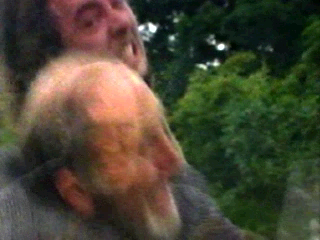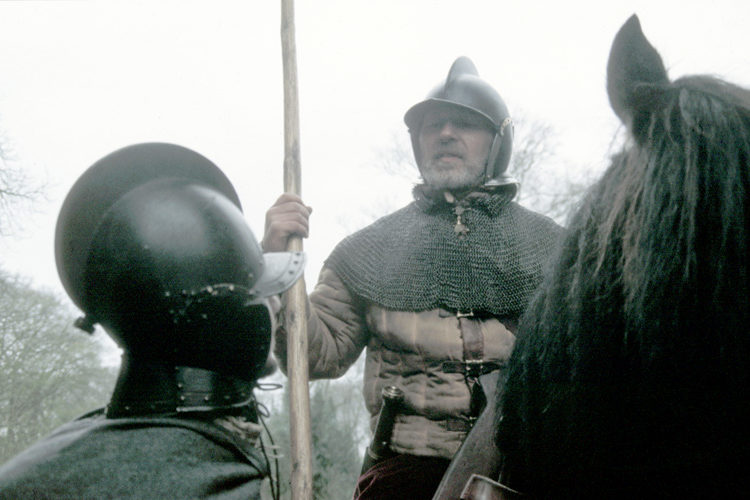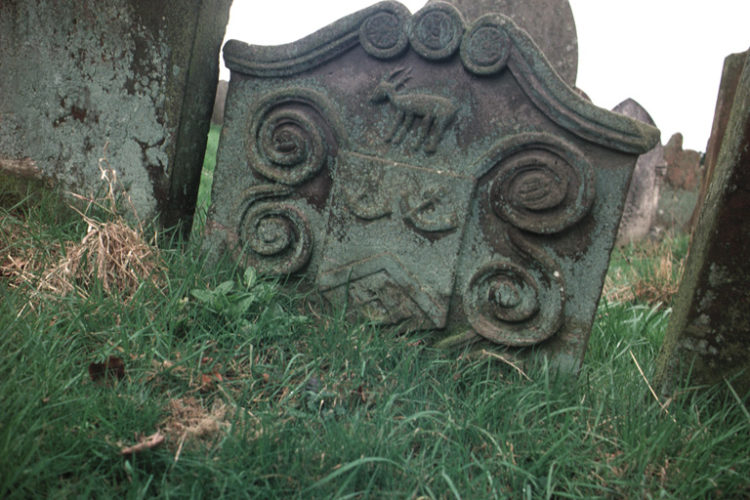The 'Peaceful Persuasion' And Transplanting Of The Marchmen By James VI Scotland & I England/Scotland…
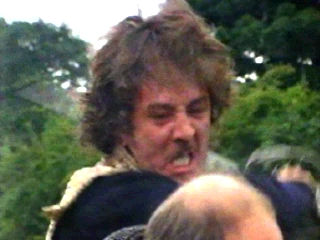
Outrages by Border Reivers
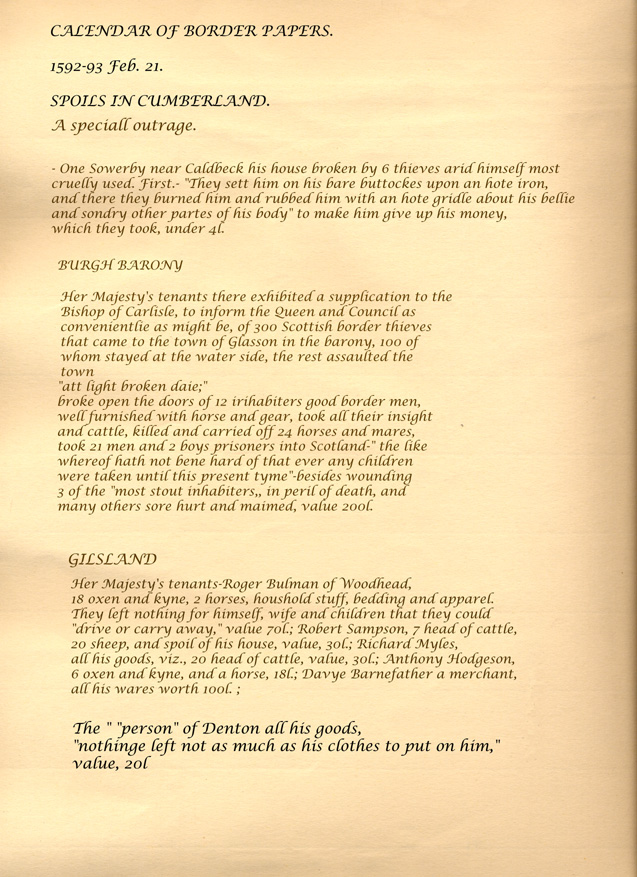
OUTRAGES BY SCOTTISH & ENGLISH REIVERS 1592-93
These are some of the complaints made by victims of raids by Scottish and English Reivers at the end of the 16th century. The complaints were made to Justices of the Peace in Cumberland. The victims hoped that the Wardens of the Marches would be able to recover their goods and bring the Reivers to justice.
The information comes from the Callendar of Border Papers. This is a series of books that summarise relevant information from the period. The original letters are held in places like the Public Records Office, The National Library of Scotland, The British Library and also held by local authority archive services.
Some of the stolen property has a value with the letter l. This stands for an English pound of the time and can not be sensibly linked to money of today. Money indicates the value that we give to something and a good way to see a comparison of values in the 16th century is to look at the information on the Inventory of Ewanrigg Tower, Cumberland.
There is a complaint recorded in 1605 that an English victim had his hand cut off by a Reiver and the Reiver was walking free with his friends in Scotland even though complaints had been made to the Scottish authorities.
An example of a raid
The following exploit of his was told to the writer by a descendant of the same family.
One morning as Barty came forth from his Pele tower he discovered that his sheep were missing. Forthwith he went up to the neighbouring Pele of his friend, Corbit Jock, to inform him of the loss.
‘Ay,’ said Corbit Jock, ‘Scotland will ha’ them dootless.’
So without more words the two friends set off upon the ‘hot trod.’ They travelled on foot down the Blakehope burn into Redewater, and so over the Carter into Scotland.
Losing the track of the sheep they determined to right themselves by ‘lifting’ the best S cots wethers they knew of, which were those at Leatham Farm, near Souden. There they selected the finest of the flock, and set off homewards, driving their booty before them. Whereupon the Scotsmen, becoming aware of this unexpected raid, sent two of their best swordsmen in pursuit. At Chattlehope Spout, Barty and Jock were overtaken, and a parley ensued. Barty generously offered to give up half of his flock, but ‘toomhanded’ he would not return home. The Scotsmen, however, would not agree to this, and soon swords were swiftly flashing upon the moor.
‘Leave the better man to me,’ cried Barty, and two desperate duels were at once in full swing.
The Scots swordsman shortly ran Barty through the thigh, but the Englishman, with a sudden wrench of his body, succeeded in snapping the sword in two, when he was promptly attacked by the second Scot, who had already slain his friend Jock.
Then Barty with a mighty back-handed sweep of his sword caught the Scot in the neck, ‘garring his heid to spang alang the heather like an inion,’ and then chased his fresh assailant and cut him down instantly. He then collected the swords, shouldered his dead friend, and drove off all the wethers [sheep] in front of him, and stayed not till he had brought back Jock to his own door-cheek [door step] and the sheep to his fold.
A SPECIAL OUTRAGE – TORTURE (original text)
“A speciall outrage.” – One Sowerby near Caldbeck his house broken by 6 thieves arid himself most cruelly used. First.- “They sett him on his bare buttockes upon an hote iron, and there they burned him and rubbed him with an hote gridle about his bellie and sondry other partes of his body” to make him give up his money, which they took, under 41.
A Special Outrage – Torture (modern text)
A man called Sowerby lived in Caldbeck, his house was broken into by 6 thieves and he was tortured. First – “They set on his bottom with a hot iron, and then they burned him and rubbed him with a hot poker around his belly and parts of his body” to make him give up his money to them.
BURGH BY SANDS – THE FIRST KID-NAPPING (original text)
Her Majesty’s tenants there exhibited a supplication to the Bishop of Carlisle, to inform the Queen and Council as convenientlie as might be, of 300 Scottish border thieves that came to the town of Glasson in the barony, 100 of whom stayed at the water side, the rest assaulted the town “att light broken daie;” broke open the doors of 12 irihabiters good border men, well furnished with horse and gear, took all their insight and cattle, killed and carried off 24 horses and mares, took 21 men and 2 boys prisoners into Scotland-” the like whereof hath not bene hard of that ever any children were taken until this present tyme”-besides wounding 3 of the “most stout inhabiters,, in peril of death, and many others sore hurt and maimed”, value 200l.
BURGH BY SANDS – THE FIRST KID-NAPPING (modern text)
A letter to the Bishop of Carlisle states that 300 Scottish border thieves came to the town of Glasson (by the Solway Firth). 100 stayed at the waterside whilst the rest assaulted the town.
At the break of day, they broke open the doors of 12 good border men, with expensive horse and gear, took all their animals, killed and stole 24 horse and mares, took 21 men and 2 boys prisoner into Scotland . Reivers had not taken children prisoner before this occasion.. The Reivers also wounded 3 of the “largest men, whilst many others were hurt and injured badly”.
EVERYTHING TAKEN BY REIVERS (original text)
Her Majesty’s tenants-Roger Bulman of Woodhead, 18 oxen and kyne, 2 horses, houshold stuff, bedding and apparel. They left nothing for himself, wife and children that they could “drive or carry away,” value 70l.;
Robert Sampson, 7 head of cattle, 20 sheep, and spoil of his house, value, 30l.;
Richard Myles, all his goods, viz., 20 head of cattle, value, 30l.;
Anthony Hodgeson, 6 oxen and kyne, and a horse, 18l.;
Davye Barnefather a merchant, all his wares worth 100l.
Everything Taken by Reivers (modern text)
A list of the items stolen by Rievers.
Roger Bulman from Woodhead lost 18 oxen and cows, 2 horses, household furniture, bedding and other items. They left nothing for himself and his family to live on and took everything they could carry away and every animal that could be herded away. Value £70
Robert Sampson, 7 cattle, 20 sheep and his house belongings. Value £30.
Richard Myles, all his goods, 20 cattle. Value £30
Anthony Hodgson, 6 oxen and cows and a horse. Value £18.
Davye Barnefather a merchant. Everything stolen that he would have sold. Value £100
THE FIRST BLACKMAIL & PROTECTION RACKET
Hutchin Graham brought one hundred and forty of his kinsmen and friends, English and Scottish, to the town of Cargo, near Carlisle, and provided them with victuals for themselves and their horses, free of cost, at the charge of the town.
“He had for many years taken this town into his protection, receiving from each husbandman four pecks of malt yearly for black mail, these pecks being of Carlisle measure, 20 gallons to the bushel.”
The particular misdemeanours of Hutchin Graham.
This complaint was made during the period called the Pacification of The Borders in 1604-5 when Reivers were hanged, expelled or forgiven.
1. On Monday after the death of the late Queen, he neglected to stay his friends from their invasion, although admonished to do so by the Bishop of Carlisle, who saw them from the ramparts of the castle.
2. On Tuesday following he brought one hundred and forty of his kinsmen and friends, English and Scottish, to the town of Cargo, near Carlisle, and provided them with victuals for themselves and their horses, free of cost, at the charge of the town. He had for many years taken this town into his protection, receiving from each husbandman four pecks of malt yearly for black mail, these pecks being of Carlisle measure, 20 gallons to the bushel.
3. On the Wednesday following, he crossed the Eden into Grinsdale, where he and his company as men of war erected two “pensills” of linen cloth on the tops of lances.
4. On that day he and his company, armed with jacks, spears, pistols, and steel caps, assaulted Capt. Bowyer, or his lieutenant, and his soldiers.
5. Seeing a company of the townsmen of Carlisle coming to the rescue of his Majesty’s soldiers, he and his company went westward. They spoiled a place called Bow, robbing men in the way, and afterwards spoiled the town of Orton, where they burned the house of Johnston and took prisoners.
6. He went back to Cargo, and there divided such spoil as was brought in by his company, he and young [Graham of] Netherby as captains taking an eighth of the whole spoil.
Reivers Steal All Clothes & Leave Victim Naked (original text)
The ” “person” of Denton all his goods, “nothinge left not as much as his clothes to put on him,” value, 20l.
Reivers Steal All Clothes & Leave Victim Naked (modern text)
The person of Denton all of his goods, nothing left as much as the clothes to put on him – he was left naked! Value £20.
Reivers Cut A Hand Off
What a tale of pain, misery and frustration must surround this petition. Not only was the man a victim of a terrible crime, but the guilty seem to go openly free of any punishment!
July 13, 1605. A petition from Hugh Carliel of Birtley.
Hugh Carliel of Birtley wrote to Lord Sheffield, Lord President of the North. He petitioned for the apprehension of Thomas Rotherforth of Rochester, John Rotherfortli, alias John the Galliard, and seven others, notorious offenders, who cut off the petitioner’s left hand. He has been striving for nine or ten years to have them apprehended, although they go publicly abroad.
Hugh Carlisle lives in Birtley near Ponteland, Northumberland. Ten years ago his hand was cut off by Thomas Rutherford of Rochester in Redesdale, further up the River Rede. He was assisted by John Rutherford who is also known as John the Galliard, and seven others. They walk around free even though Mr Carlisle has been trying to have them brought to justice for ten years.
Worksheet Exercises
These terrible crimes make us feel that the Borders were not a safe place to live during the 16th century. However, some people may say that there is a lot of crime today.
Make a list of awful crimes that are in the news. Write it down like the list above.
Find a partner and one of you act the opinion that things today are much better, and the other act the part of saying that things are not much better. Remember that you must give reasons and evidence why you think something.
1. Imagine that you are in a courtroom where there is a Reiver who has committed some of these crimes. In the 16th century the Reiver would often be hanged. Prisons were not very common because nobody wanted to pay for criminals, punish them or kill them, why feed and house them? You are a reporter from today who has travelled back in time to the court room.
2. Write an article in which you give your opinions about the crimes and the punishments.
3. Remember that the newspaper article will be read by today’s readers and they do not know anything about the Reivers so write everything clearly.
4. If you type out the article then you can cut and paste pictures from the Reivers website.
5. Call the newspaper article “The Reiving Times”
6. Ask you r teacher to contact admin@reivers.info to arrange for the best examples of “The Reiving Times” to be submitted for a competition. Only teachers should do this, not students.
Worksheet
This activity can be carried out in a group or be carried out individually.
Imagine the following scenario and discuss your reactions.
You can write your comments as a letter and send it to the Warden of the March.
You can give a verbal response to the Warden (your teacher).
The situation
Reivers have been raiding villages in your area. Their raiding parties are becoming bigger and very organised. The Warden of your March suspects that the King from over the border is encouraging these bigger raids and he thinks the big raids may end up as an invasion of your country. If this happens then the border will be re-drawn and you may find that your village is claimed by the other country!
You must defend your family, your village and your country. There is no army but every man from the age of 12 is expected to be able to use a weapon and is expected to form a people’s army called a militia when the Warden demands it. The law says that you must practice using your weapons or you will be fined. Some weapons are like the tools that you use on the farm, such as an axe or bill-hook on a pole so you feel competent with these familiar weapons. People sometimes like to practice archery because it is a sport as well as a weapon for the militia.
Today your villagers have been told that you will buy and use a new weapon called a ‘callyvers’ (a gun like a musket). You have never used one and have heard good and bad stories about them. You know they cost a lot of money and it costs money to buy the powder and shot to practice with. They also have a reputation of being dangerous to use.
Prepare the responses from the villagers. To assist your response you may consider the following:
Women and children of the village want to be protected.
Some people like high tech gadgets, especially if there is a flash and bang.
Some people can not afford the new weapons.
The weapon sometimes does not work.
The weapon sometimes blows up in your face.
Perhaps some of the rich people can buy the weapon and get the poor people to use it.
The weapon can be used as a spear or club if it can not be re-loaded.
The Reivers have started to use pistols in their raids.
Horses of the Reivers are scared by the noise.
Remember to look at the video sections about weapons.
Read the section on the shot pouch and remember that fights often happened on rainy days.
Think about the choice between shooting someone from a distance and having to get close to them in hand to hand combat with swords and daggers.
Development work
Act out the village arguments as a play. Start with a group discussion, then write down your work then get together and write the play. Then perform the play.

